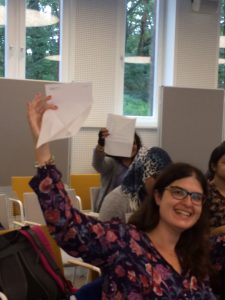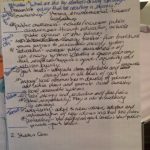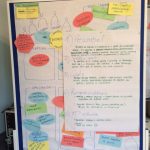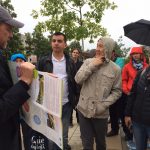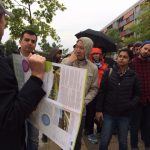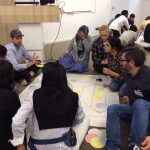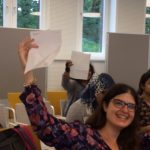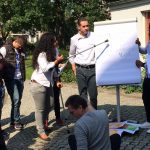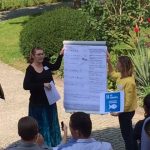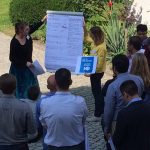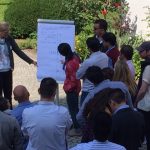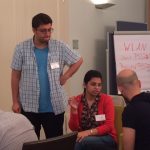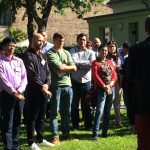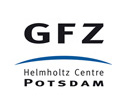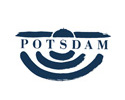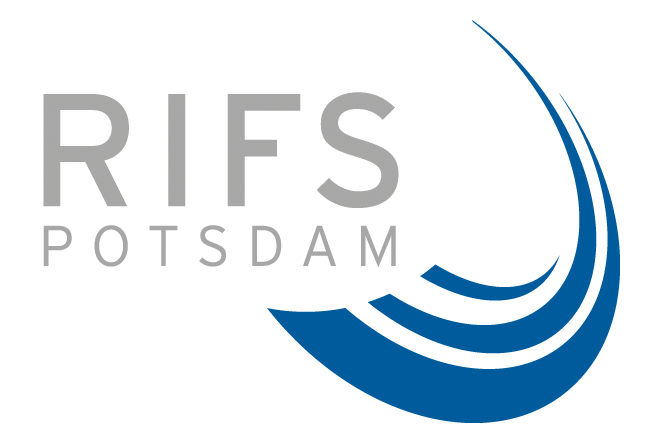Manifesto PSS 2017
The Manifesto of the Participants of the 2017 Potsdam Summer School
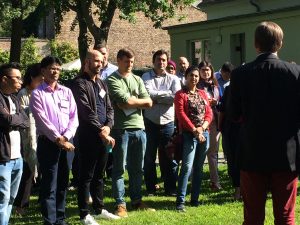 Preamble
Preamble
We care about clean energy and the reduction of fossil fuel use throughout the world. We care about inclusiveness, respect, and transparency in the creation and implementation of climate change policies. We value the rights of every human being and of future generations; these must be respected and included in decision-making processes. We value living in a society with informed and action-conscious members who foster sustainable development that provides a healthy life for all. We believe in the shared responsibility of states to reduce carbon dioxide emissions both at the state and global level.
We believe in knowledge as a driver for sustainable change. It is crucial to enable an inclusive knowledge cycle, including knowledge generation, management, implementation, communication, and evaluation.
We care about making the voices of communities and marginalized groups heard in discussions of climate change policy and implementation. We value a balanced and comprehensive approach to the complex processes involved in determining environmental policy and shaping a livable future for all. We believe that in order to implement effective climate change mitigation policies, various actors and stakeholders need to harness indigenous knowledge and participate in discussions with local communities to see how their different approaches can work in a complementary way towards the goal of sustainability. Integrating community values, history, and heritage into climate change mitigation will help create more effective policies and implementations that are sensitive to local contexts and beliefs and therefore more likely to succeed. Policies affect different population groups differently – climate change needs to be implemented with social justice and equity in mind.
We believe urban areas can be engines of economic growth and sources of innovation for technology, organizations, infrastructure, and institutions. Urban areas contribute significantly to environment degradation; we therefore aim to achieve resilient and sustainable urban areas now and the future.
We need to listen deeply and be heard in discussions about climate change. This will help foster a sense of connectedness and mutual understanding. A lot of promising potential can be harnessed from such open, inclusive interactions between the public, stakeholders, and experts in the field. This process is called co-creation and it is our most valuable resource in transnational efforts to halt the progression of climate change.
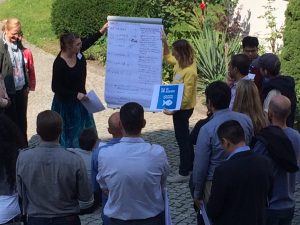 Summary
Summary
We have been having discussions in various focus groups reflecting the interest and expertise of our group. In these conversations we have come to the following key insights:
Where do we stand? (Systems Knowledge-Status Quo)
Currently we are facing a variety of challenges:
Globally, we see leadership without environmental conscientiousness. We see governments who do not prioritize environmental sustainability and resilience building. Public awareness of and concern for the environmental issues we are facing is low. In many parts of the world, we see a sense of hopelessness and an inability to identify long-term solutions at both the local and state level. But we also see an increase in environmental education which is improving public awareness. Many schools are adopting strategies to ensure children are more informed about the ways global issues impact people at the local level.
In developing countries, there is insufficient information on means of including multiple stakeholders in governance systems. Even in countries where this information is widely accessible, environmental sustainability is not prioritized. National governments often have an economic growth-oriented approach which does not always take the other pillars of sustainability into account. Policy-makers cherry-pick results that confirm their beliefs and agendas. Scientists do not have complete data that can provide other actors with absolute certainty. The challenge is therefore to harness the knowledge we do have – with all its insufficiencies – and to put it to good use in the planning of more effective climate change policies. Interdisciplinary dialogue and communication are key here: scientific knowledge and socio-economic contexts must both be considered in policy-making.
There are gaps in communication between the public and the scientific community, between scientific and humanistic approaches and fields of expertise, between abstract knowledge and implementation. Often, when the different actors and stakeholders involved in climate change policy and mitigation communicate, valuable insights get lost in translation. We also see inefficient cooperation between different stakeholders and experts. Agendas are often hidden, and misunderstandings and differences in priorities abound, blocking the process of moving towards a common solution.
Cities are responsible for 70% of global energy-related carbon emissions, and contribute to air pollution and other environmental impacts that affect human health. It is widely known in the scientific, political, and civil realms that intensive human activities are leading to changes in the global climate, and that global temperatures are increasing annually. Greenhouse gases emitted globally by industries, households, transportation systems, etc., are already having negative impacts on environmental processes and on the people who depend on them for survival. Working together to mitigate climate change and adapt to changing environmental conditions is the only way of counteracting these changes. Sticking to the UNFCCC guidelines, the Paris Agreement, the Kyoto Protocol, and other mechanisms and agreements put in place by the global community are the best ways of preventing these global changes from accelerating.
Where should we go? (Orientation Knowledge-Goals/Objectives)
Given this situation we have identified several goals that should be pursued, and they include:
Studying climate change involves a variety of different systems that are all interconnected and interdependent that influence one another. However, these disciplines (economics, ecology, sociology, psychology, law, biology, urban planning, etc.) often operate as isolated, self-contained fields and do not generate sufficient transdisciplinary discussions between them. Our goal is to make these fields work together and learn from each other.
We need to improve the transfer of scientific knowledge into policy, and to increase mutual understanding, partnership, co-operation for better policy outputs.
We need to transition from traditional power sources to renewable energy. We need an increase in public awareness of renewable energy systems and an overall reorganization of our current economic system in order to change it into a green economy that supports equality and reduces poverty. We need to achieve sustainable growth, while mainstreaming the United Nations’ Sustainable Development Goals. We need better regulatory policies, and we need to promote governance that creates an enabling environment for sustainability.
Sustainable Development Goal 7 (Affordable and Clean Energy), Goal 11 (Sustainable Cities and Communities), and Goal 13 (Climate Action) are particularly important in the present. We strongly believe that if all national governments and NGOs took collective and coordinated action to implement these three goals, it would significantly increase human health and quality of life around the world, and would slow the progression of global warming. Humankind must collectively develop and apply effective energy production and consumption strategies, switch to green and renewable energies and undertake global action to mitigate and adapt to climate change.
We need to work towards achieving sustainable, self-sufficient cities (in terms of food and energy production), while preserving cultural heritage and natural reserves.
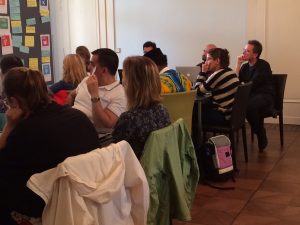 How do we get there? (Transformation Knowledge-Recommendations)
How do we get there? (Transformation Knowledge-Recommendations)
In order to achieve these goals we recommend the following:
We recommend using transdisciplinary approaches to solve the complex problem of climate change by fostering collaboration between experts in different fields, and by putting local communities and local governments in touch with the relevant experts, activists, and NGOs. These actors can help them implement practices that will create sustainable communities, and that are conscious of local ecological specificities and of economic and social conditions in the relevant regions.
We recommend the integration of clean, affordable, and renewable energy at the local and global levels. We recommend that all governments evaluate decisions against the Sustainable Development Goals they have pledged to uphold. We recommend strong and continuous engagement with local communities in the development of policies and action plans, and the promotion of local ownership in renewable systems.
We recommend applying innovative approaches for wider participation in policy planning, and creating a balance between top-down and bottom-up approaches, and combining different methods to promote inclusiveness. We strongly recommend enhancing compliance mechanisms and ensuring accountability. We believe that developing context-appropriate indicators we can also enhance the positive impacts of climate change assessments and policies.
We recommend the fostering of urban farming and agriculture initiatives, the investment in decentralized renewable energy sources, the building of green and energy-efficiency technologies, and the deployment the use of green spaces to act as “bio corridors” in urban areas.
We recommend using collective participatory exercises that include both actors and experts to think collectively about how to address issues in ways that are mutually beneficial. We acknowledge that it is very challenging to understand other actors’ positions; these are not self-evident. It should be clear that the basic requirement for positive and effective cooperation between actors with different priorities is clear communication, openness, and a willingness to listen. We recommend dedicating a lot of time to the process of understanding other actors’ and stakeholders’ positions. Conflict resolution, negotiation, and mediation techniques are useful in this process.
We recommend creating a bank of shared knowledge and open forums to facilitate cooperation between different actors, and dedicating resources (time, finances, education) to the entire process of knowledge gathering and analysis.
We recommend increasing effectiveness in global cooperation and partnerships, including all stakeholders and interested parties, as well as a strengthening of international agreements and organizations. We recommend giving an impetus to international research in the field of climate change mitigation and adaptation, creating a new international framework for global research and scientific action with the active participation of scientists from all nations, especially developing ones. We recommend ensuring gender equality and inclusive participation of all stakeholders and interested parties in the process of climate change mitigation, and the creation of effective frameworks that promote renewable energy technologies and bridge the gaps between science, policy, economy, and society.
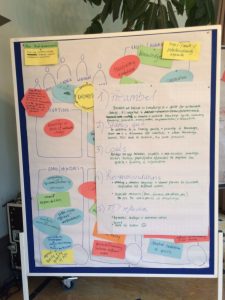 Transdisciplinarity (Process reflection)
Transdisciplinarity (Process reflection)
We come from different disciplinary backgrounds and hold different perspectives. From the beginning, we respected each other’s opinions and had the patience to listen to what each of us had to contribute. Our goals necessitate a transdisciplinary approach, and we harnessed each other’s expertise to arrive at shared goals and views that are conscious of the local, cultural, historical specificities in dealing with climate change.
We started with different questions and motivations, and our analysis of these topics was done following a cyclical process that started with brainstorming of ideas collected during the day and debating amongst ourselves, and ended with reaching a clear statement of our shared goals. The goal was not to reach a consensus, but to arrive at an understanding of all the proposed ideas, and to work together to improve them. Some challenges included the fragmentation of the process, both in terms of the incompleteness of the working group’s knowledge and the substantive discussions, the difficulty in understanding each other’s points, and the integration of proposed ideas while maintaining the coherence of our goals.
Finally, groups ended up working synergistically, engaging in a common, dynamic dialogue, engaging in an inclusive and collective process, and discovering a shared sense of humor which in the end allowed for more efficient communication in working towards a coherent goal.
Focus topics
Constituted by the interest and expertise of the participants we have established focus groups in which we reflected the topics of the summer school
Gap Minders – improving communication and transdisciplinary knowledge integration
Gap Minders takes a complex systems approach to climate change adaptation and mitigation. We take a bird’s eye view of climate change discourse and policy and study the way different actors and systems interact (or not) with each other. Our main objective is to minimize (and ideally eliminate) gaps that we see in both public and academic discussions of climate change. Our goal is to provide a map of the blind spots that are omnipresent in climate change research and policy in order to identify new avenues for research and new pathways for mitigation and adaptation.
One concrete example of how Gap Minders’ approach can contribute to climate change mitigation research is through the creation of public forums where experts, lay people, and activists can work together to find solutions to local problems. This would help foster useful communication between different actors and harness a variety of tools to facilitate mutual understanding between them. For instance, using narratives to supplement graphs, charts and statistics will help communicate knowledge from a specific field of expertise to a wider audience. Using the skills of communication experts to help relay information in a precise but accessible manner can help minimize gaps in communication between experts and lay people.
The Umbrella – For an integrated knowledge cycle
Our group shared the vision of knowledge as a central driver for sustainable change. However, we identified both a lack of quality and quantity in available and used knowledge when looking at the implementation of the Sustainable Development Goals. Too often knowledge is generated in an exclusive and uni-disciplinary way, stemming from a top-down approach and academic methodologies, which excludes non-academic actors from knowledge production. This can lead to both misunderstandings and conclusions which are out of touch with reality and cannot easily be translated into concrete policies and action recommendations.
Thus, we regard it as important to enable an inclusive knowledge cycle which connects actors from academia and society from the generation to the management and implementation of knowledge. Key values we identified for this cooperative process are:
-
equality between all the actors, regardless of academic, professional and cultural background, gender, race, class, and age;
-
transparency both in regard to which actors are involved and why, and to how knowledge is generated, managed and implemented;
-
a transdisciplinary approach which integrates and embraces different knowledge systems and enables connected top-down and bottom-up processes.
Our recommendations to facilitate an inclusive knowledge cycle include:
-
creating an actual or virtual place which enables various actors to get together, to share their specific insights, to come to a shared understanding, and to co-develop meaningful solutions;
-
coming to a shared language, free from jargon and abbreviations;
-
increasing financial funds and/or better allocating financial funds, which allows for knowledge generation on all levels and facilitation of the entire knowledge cycle;
-
building capacities, allowing non-academic actors and early career scientists to engage in joint knowledge generation.
Climate Lords
A better world is possible if we manage to reduce the impact of climate change by significantly decreasing of carbon dioxide emissions, ensuring increased access to renewable energy throughout the world, ameliorating urban planning to improve cities’ resilience and inclusiveness. To do so, we will recommend following the SDGs guidelines, enhancing global cooperation, ensuring active participation from the public, fostering a green economy, and ensuring compliance with governance parameters.
Global climate change is becoming more significant in recent years and the governments are well-aware of the implications of poor governance. Therefore, a coherent strategy to deal with these issues is more crucial than ever before.
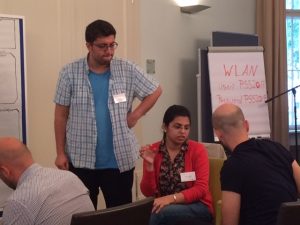 Urban Transformers
Urban Transformers
We aim to make our cities and human settlements inclusive, safe, resilient, and sustainable. Therefore, we have raised questions to achieve these goals in a transformative manner that includes protecting social and natural heritages, equity and social inclusiveness, human security and wellbeing. It is challenging but essential to form a new governance mechanism with participation that includes different actors (citizen groups, NGOs, business representatives, and administrative bodies) to reflect the three dimensions of sustainability at the urban scale: environment, society, and economy. Cities are the places where consumption and production are intensively high; therefore to decarbonize our economy and build a strong infrastructure to cope with the squatter houses, inadequate ecological services, and transportation, a drastic transformation is needed to achieve sustainability. It requires an enormous amount of funding to invest in “self-sufficiency” in terms of food and energy. With enough financial support, we can develop well-structured regulatory frameworks, create urban food production (urban farming), green building initiatives, and energy-efficiency codes for residential and industrial areas.
The Nexus
The science-policy interface today needs to be improved. While the risks we face as a community of states and as a global society become more and more complex, the current process of transferring scientific knowledge in its relevant context to policymakers and into concrete policy continues to suffer from three distinct dysfunctions. First, there is not enough scientific knowledge readily available or transferrable, and not enough relevant context for it to be workable in different settings. Second, even when scientific knowledge is available and transferrable, the channels of communication or the products of policy advice function inefficiently. Third, the policy advice is either not framed well enough to be workable in a political setting, or the constraints in available time and attention that structure the political process do not allow for the transformation of scientific advice into action.
This points to a more structural problem on the level of individual actors: due to long-standing political identities (identity path-dependency) and the adversarial nature of the political process (politicization of science), there is a strong incentive for policymakers to cherry-pick scientific data and results that only confirm their beliefs and political agendas. Conversely, scientists tend to be detached from politics to the degree that they negate the political nature of some of their research. The constraints inherent in the scientific method (i.e. incompleteness of data, strong contextualization, tentativeness of knowledge) also make scientists word messages that are cautious and ambiguous – and often unworkable in political settings.
The goal is, thus, to improve the process of translation from science into policy (Goal 1). This, however, can only be achieved if the specific constraints and functional logics of the two arenas are understood and respected. Apart from increasing mutual understanding and enhancing the partnership between science and policy, opportunities for co-creation of policy-relevant knowledge as well as processes of permanent learning feedback need to be established (Goal 2).
More multi- and transdisciplinary studies are needed to discover and bridge the science-policy divide. In the meantime, policymakers should take the initiative and create a structured science-policy dialogue that includes a tight feedback loop between the actors. This would allow for a more permanent and comprehensive communication between scientists and policymakers. The dialogue and feedback loop can also help policymakers locate scientific support for their own agendas to identify further issues to work on. This dialogue should include the research assistants of congressmen who do most of the heavy-lifting of policy formulation.
Use collective participatory exercises that include actors from science and policy to think collectively about how to address issues together – and also how to come up with sensible and workable indicators that would facilitate science-policy communication. Traditional products of policy advice (briefs, manuals, talks, online tutorials) will remain relevant, but these opportunities for policy-oriented co-creation provide more “win-win learning” to adapt political agendas and to better inform policy. Making time for co-creation on both sides of the science-policy divide will significantly improve mutual understanding and relevant knowledge about each group to the other – ultimately improving the quality of policy and regulation to the benefit of all.
Policy in Action
We have come to the conclusion that there is a tendency to focus on economic growth without keeping sustainable development approaches in mind. In developing countries there is a problem of scarcity of reliable data which leads to asymmetric information use in policy making processes. The unilateral (top-bottom / bottom-up) approach makes it difficult to formulate and implement the inclusive policies and actions for sustainable development. The policies often do not include the obligation to make the ex-ante and ex-post policy evaluations, considering transdisciplinary (environmental, economic, and social) aspects, which are based on the reliable and measurable indicators.
Our main goals are firstly to reach sustainable growth and secondly to turn SDGs into better regulation policies, to promote governance that enables environmental sustainability, and to ensure the continuity of policy at every level. We recommend:
- implementing innovative approaches for participation in policies planning tools;
- harvesting reliable data in the process of policy formulation by using modern techniques and tools
- creating compliance mechanisms in order to ensure the implementation of policies;
- developing reliable and measurable indicators for multidimensional ex-ante and ex-post evaluations.
Narratives – Process is paramount: it is the coming together that counts
We started with many ideas and different perspectives focused on the topic of communication. We were enthusiastic because each group member wrote down a question that we thought linked us thematically. However, we quickly discovered that this was not the case.
Our first step was to expand on our questions. We felt it was important to explain what we had written and what motivated us. The common ground that we thought we shared fell away – by examining the values and backgrounds of each person, we confronted many differences in meaning and understanding, which led to many disagreements about semantics, objectives, and even process. At this point we agreed that we were disagreeing – and this actually relieved a lot of pressure. We acknowledged our shared concerns and in this, we realized our common struggle to understand each other. This made us feel more cohesive. This was reinforced when one group member announced they would be absent the next day and jokingly added, “Please don’t make too much progress without me.” We realized we still disagreed on many things, but we wanted to work together. We wanted to continue making progress together.
Having created a common ground, we moved from discussing issues to focusing on how the group should work together harmoniously. On the one hand, we did not achieve the concrete outcomes that we all came to the table with. On the other hand, we also gained a greater appreciation of the process. We realized that people will want to remain at the table and contribute ideas and build on those of others if they feel heard and there is mutual understanding among them. We feel satisfied with having participated in the process.
